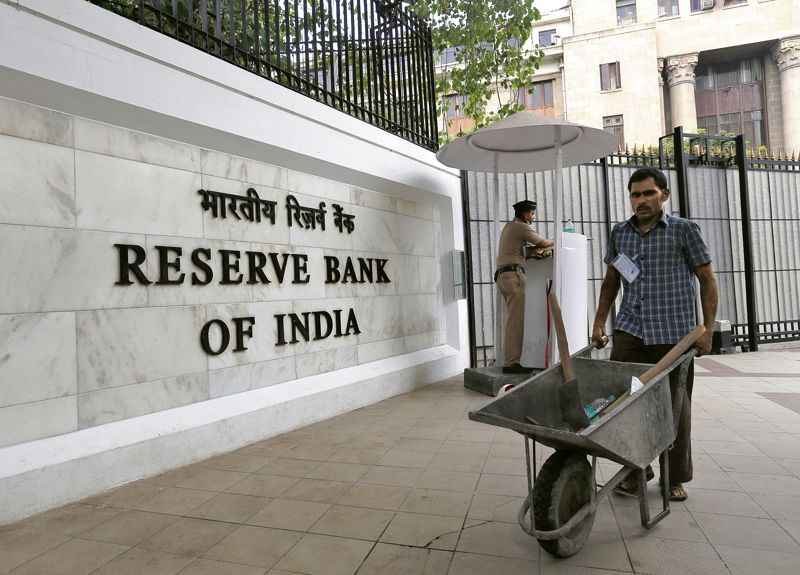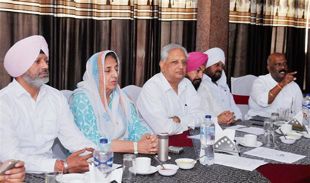
IMPERATIVE: RBI needs human and technical resources to supervise forensic audits. Reuters
Brajesh Kumar Tiwari
Associate Professor, AB Vajpayee School of Mgmt & Entrepreneurship, JNU
MINISTER of State (Finance) Bhagwat Karad told the Lok Sabha last month that as on March 31, 2023, there were 2,623 borrowers in India who had been officially categorised as wilful defaulters. These borrowers collectively owe Rs 1,96,049 crore to banks across the country. Karad stated that Scheduled Commercial Banks (SCBs) and all-India financial institutions were required to submit credit information for all borrowers with a total exposure of Rs 5 crore or above to the Central Repository of Information on Large Credits.
According to data of the Reserve Bank of India (RBI), banks have written off a staggering amount of over Rs 15 lakh crore since the 2012-13 financial year. A bank writes off a loan when the borrower has defaulted on the repayment and the likelihood of recovery is extremely low. The bank then removes the non-performing asset (NPA) from the assets section and records the amount as a loss. Experts frown on this practice, but banks routinely do it as part of their tax management clean-up process. The beneficiaries are almost always some of our most egregious industrialist defaulters.
After a loan has been written off, banks are required to continue pursuing various options to recover it. However, according to the RBI, banks recovered only Rs 1,09,186 crore (18.6 per cent) out of Rs 5,86,891 crore in loan write-offs in the past three years. Everyone in the nation is impacted by the excessive loss to the banks because the money deposited there belongs to the country’s citizens. According to RBI data, NPA write-offs in SCBs (including wilful defaulters) were to the tune of Rs 63,000 crore between FY2005 and FY2014, but they skyrocketed to Rs 12.3 lakh crore between FY2015 and FY2022. The increase is largely attributed to then UPA government’s overzealous loan sanctioning and evergreening policies. Banks and businesses often use restructuring as a way to keep reporting their NPAs at low levels. Evergreening loans is the practice of giving more loans to a borrower who is about to stop paying so that the loan stays on the books as being paid.
Between 2000 and 2014, companies could choose more flexible ways to restructure loans, which led to many of them getting new loans from banks to keep their loan portfolios going. Even though the bankruptcy code has made it harder to keep a business going forever, the rate of recovery is still very low. According to a reply made in the Rajya Sabha (March 28, 2023), the recovery of NPAs that had been written off was only 16.6 per cent from FY18 to FY22.
The quantum of banking frauds has increased 17 times — from Rs 34,993 crore (2005-14) to Rs 5.89 lakh crore during 2015-23. According to the RBI’s Financial Stability Report, which came out on June 28, 2023, the SCBs’ gross non-performing assets ratio continued its downtrend and fell to a 10-year low of 3.9 per cent in March 2023. It should be noted that if the amount of write-off is included, the total NPAs would rise to 7.47 per cent, whereas banks are currently reporting 3.9 per cent.
According to the report, “Write-offs by public sector banks increased from Rs 7,187 crore in 2013 to Rs 1,19,713 crore in 2022.” The SBI has written off the most money among these public sector banks in the past 10 years, amounting to Rs 2,97,196 crore, followed by PNB (Rs 92,511 crore), Bank of Baroda (Rs 75,429 crore) and Bank of India (Rs 53,961 crore). For private banks, the aggregate amount of write-offs rose from Rs 4,115.02 crore in 2013 to Rs 53,087.03 crore in March 2022.
In FY21-22, the total write-offs by public and private sector banks totalled Rs 1,72,800 crore, far exceeding the amount allocated to any of the three key social sectors, namely rural employment (MGNREGA), health or education in FY23-24. The NDA government has so far given Rs 2.76 lakh crore for the recapitalisation of public sector banks.
In India, deliberate defaults are characterised by insufficient assessment conducted prior to loan approval and a deficiency in monitoring. Banks experience a decrease in their net interest margin due to high NPAs, and at the same time, their operating costs steadily increase. In order to offset these expenses, banks increase the convenience fee imposed on their smaller clientele. The frauds in the banking industry can be divided into four categories — ‘management’, ‘outsider’, ‘insider’, and ‘insider and outsider’ (jointly). Operational errors are the root cause of fraudulent activities, regardless of whether they originate from within the organisation or externally. Deloitte’s research indicates that inadequate examination prior to disbursing funds (21 per cent) and restricted supervision of assets following disbursement (38 per cent) were the primary factors contributing to stressed assets and NPAs, respectively.
Prudent lending is crucial for banks as it helps mitigate the risk of NPAs caused by bad loans. Regulation of chartered accountants is necessary to curb the occurrence of bank NPAs. Banks should exercise caution when lending to Indian enterprises with significant overseas loans. The internal and external audit mechanisms of banks require immediate enhancement. Senior officers are responsible for making judgments about the credit sanctioning committee, whereas lower officers frequently face culpability for instances of default. Therefore, it is imperative that senior officers are held responsible.
Public sector banks should establish an internal rating agency to rigorously evaluate large projects before lending. To monitor a business project’s early warning signals, a good MIS (Management Information System) is needed. RBI needs human and technical resources to supervise forensic audits. AI-monitored financial transactions can greatly reduce financial fraud. Digitisation beyond a certain point may be misguided because artificial intelligence only considers quantitative data.
The branch’s inputs on the borrowers’ background and other ground realities are crucial to risk assessment. India should improve debt recovery instead of writing off large corporate bad loans. It is imperative to implement significant modifications in the bank credit framework, encompassing reforms that extend from the branches to the very core of the system. It is important to draw lessons from Islamic banking, where the bank does not provide loans but rather purchases the necessary assets on behalf of the borrower who is prepared to acquire them. In this scenario, the meal is directly provided to the ‘beggar’ to prevent him/her from using the alms wastefully.
Views are personal
Join Whatsapp Channel of The Tribune for latest updates.




























